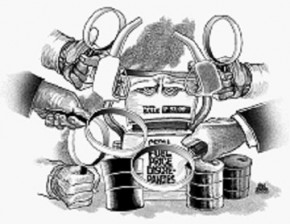Transparent audit
 There is something to hope for, however little, about the Department of Energy’s (DOE) announcement that it will create a team that will examine the financial statements of six oil companies belonging to the Philippine Institute of Petroleum (PIP).
There is something to hope for, however little, about the Department of Energy’s (DOE) announcement that it will create a team that will examine the financial statements of six oil companies belonging to the Philippine Institute of Petroleum (PIP).
These companies include the Big Three of Petron, Pilipinas Shell Petroleum Corp. and Chevron Philippines. The other three are Total Philippines Inc., Liquigaz Philippines Corp. and PTT Philippines Inc.
According to Energy Secretary Rene Almendras, the PIP team’s audit will hopefully clear the long-standing public suspicions about oil price rigging and collusion among the oil companies.
Considering that there were two previous audits of oil companies in 2006 and 2008 and yet these suspicions still continue to fester, it’s no surprise that the PIP audit will also invite the same, if not increased skepticism and doubts from a public already weary from the burden of ever rising fuel prices.
The so-called team will consist of a representative from the academe, a consumer representative, transport group leader and even representatives from media. How this audit will play out is anybody’s guess but it is reasonable to expect that guidelines and parameters should first be established in conducting the audit of the oil companies.
There is some basis for the skepticism about this audit. To cite a comparison, a multisectoral arrangement already exists in the Regional Tripartite Wages and Productivity Board (RTWPB) and yet wage increases often fail to satisfy the expectations of the labor sector even if they have in recent years learned to scale down their demands.
Participants in the audit would come in with their own set of expectations and may come away unsatisfied and raising more questions than answers. That is why it’s important to establish and promote the guidelines and parameters not only to the team but also to the public, who are generally unfamiliar with and don’t care much for accounting terms and methodology.
The inclusion of a journalist and/or media representative was intended to convey transparency, but even then, we wonder if the team could be expanded to include social media especially outsiders with proven expertise in the energy sector and with no hidden agenda.
No matter the expectations, the audit findings will prove useful in determining whether these oil companies truly profited in excess from the public, are merely part of the larger problem that is the global cartel or both. Or even, however remote the possibility, that they neither profiteered nor succumbed to a cartel.
These findings should be transparent, easily understood and accessible to the person on the street.
We wish that these financial audits become a regular feature of the DOE but we’re getting ahead of ourselves. For now, the PIP audit is a promising start.














